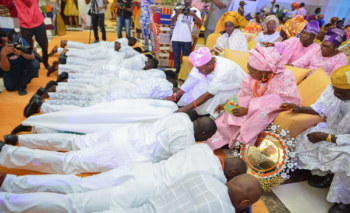Exploring Lagos or other Western Nigerian states, you’ll quickly discover that greetings and everyday phrases are a vital component of daily life. Mastering key Yoruba words and greetings can help you connect with locals and delve into the rich cultural heritage of the Yoruba people.
Common Yoruba Phrases You’ll Encounter in Lagos
Nibo, Eélòó ni?, Fun mi leleyi, Sare, Oto, and Ejo are some common Yoruba words you will encounter when you visit Lagos or other western states in Nigeria. These phrases are frequently heard at almost every corner of Lagos, especially when you’re looking to board a commercial bus (Danfo), explore markets, or navigate the roads.
It is widely acknowledged that the Yoruba people are one of the tribes in Nigeria that attach great importance to greetings.
The Culture of Greetings Among the Yoruba People
As Lagosians and Nigerians will attest, Yorùbá people have greetings for every occasion, even for what you would least anticipate, like Ẹ kú ìjòkò (Greetings as you are seated), Ẹ kú fàájì (Greetings to a person enjoying), and many more.
Most notably, as a sign of respect to the elderly, the females kneel to greet them while the males prostrate themselves on the ground facing the floor.
This article will help you learn and comprehend common and useful Yoruba phrases you will need if you visit Lagos or other western states in Nigeria.
Important Yoruba Greetings and Their Meanings
| Yoruba Phrases | Pronunciation | Meaning |
| Ẹ n lẹ | En-lɪ (ehn leh) | Hello |
| Ẹ káárọ | E-ka:-rɒ (eh kah-ROH) | Good morning |
| E káàsán | E-ka:h–sɒhn (eh Kah-SAHN) | Good afternoon |
| Ẹ káalẹ́ | E-ka:-le (eh KAH -leh) | Good evening |
| E káàbọ̀ | E kɑːˈbɒ | Welcome |
| Ẹ ṣé | e ʃɪ (e-Sheh) | Thank you |
| Ẹ ṣé gan | e- ʃɪ-ɡɒn (eh Shay gahn) | Thank you very much (to show immense gratitude). |
| kò tọ́pẹ́ | kəʊ- tɒh- peh (koh Toh-peh) | It’s nothing. Don’t mention. (Used to say you are welcome when someone thanks you) |
| Báwo ni? | bɑː-wəʊ-ni: (BAH-woh nee) | How are you? |
| Ẹ pẹlẹ | E-pe-le (eh peh-LEH) | Sorry |
| Bẹ́ẹ̀ ni | Be ni: | Yes |
| Bóyá | Bəʊ ya:h | Maybe |
| Bẹ́ẹ̀ kọ́Rárá | Be kɒRa: Ra: | No |
| Mowa dada, Ese | Məʊwa: da:da:, E ʃɪ | I’m fine, thank you! |
| Iwo nko | I:wɒ ŋkɒ | And you? |
| Oda | Oda: | Good |
| Wole wa | Wɒlɪ wa: | Come in! (or: enter!) |
| Od’aro | Oda:rɒ | Good night |
| Ó dàbọ̀ | Oda:bɒ | Good bye |
Important Yoruba Words for Navigating Conversations and Directions
| Yoruba Phrases | Pronunciation | Meaning |
| Ibo l’ongbe/ Nibo ni o ngbe | iːbəʊ ləʊnˈbɪ/ ni:bəʊ ni: əʊn ɡbɪ (EE-boh lon-beh/ NEE-boh nee ohn GBEH) | Where do you live? |
| Kíni orúkọ rẹ | ˈkiːni: əʊˈruːkɔː re (KEE-nee oh-ROO-koh reh) | What is your name? |
| Orúkọ mi ni ____ | My name is _____. | |
| Mò ń bọ̀ | Məʊ n bɒ | I am coming |
| mo n lọ | məʊ n lɒ(mohn law) | I am going/I am leaving |
| Mo ń lọ sí ilé | məʊ n lɒ siː i: lɪ (moh n law see ee-LAY) | I am going to my house. |
| Nibo ni… | niːbəʊ ni: (NEE-boh nee) | Where is… |
| Dúró | Duːrəʊ (DOO-roh) | Stop |
| Inú mi dùn láti pàda ẹ | I:nu: mi: du:n la:ti: pa:da: e | I’m happy to meet you. |
| Ṣé o lè sọ̀rọ̀ díẹ̀ díẹ̀? | ʃɪ o lɪ sɒrɒ dɪə dɪə | Can you speak slower? |
| Ṣé ó yé ẹ?Ṣé ó yé yín? | ʃɪ o yɪ eʃɪ o yɪ yi:n | Do you understand? |
| Ó yé mi | O yɪ mi: | I understand |
| kò yé mi | Kəʊ yɪ mi: | I don’t understand |
| Mo mọ̀ | Məʊ mɒ | I know |
| Mi ò mọ̀ | Mi: o mɒ | I don’t know |
| Ṣé o máa ń sọ èdè ____Faransé?
Gẹ̀ẹ́sì? Igbo? Twi? |
ʃɪ o ma: ŋ sɒ ɪdɪ_____ | Do you speak____?French?
English? Igbo? Twi? |
| Jẹ́ ká lọ | dʒ ka: lɒ | Let’s go |
| ẹ jẹ́ ká lọ | E dʒ ka: lɒ | Let’s go (Older/Plural) |
| Mo ni lati lọ | Məʊ ni: la:ti: lɒ | I have to go |
| Eélòó? | ɪ ləʊ | How much? |
| Eélòó ni oúnjẹ yìí? | ɪ ləʊ ni: əʊŋdʒ yi: | How much is this food? |
| Màá rí ẹ ní ọ̀la | Ma: ri: e ni: ɒla: | See you tomorrow. |
| Ó ti rẹ̀ mí | O ti: re mi: | I’m tired |
In summary, learning some key Yoruba words and greetings can significantly enrich your experience when visiting Lagos or other Western Nigerian states.
By using warm greetings like “Ẹ káárọ” (Good morning), “Ẹ n lẹ” (Hello), or “Ẹ káalẹ́” (Good evening), you’ll not only show respect for the culture but also reflect the rich heritage of Yoruba-speaking communities.
Familiarizing yourself with proper Yoruba greetings and responses, such as “Ẹ ṣé” (Thank you) or “Báwo ni?” (How are you?), can help you build stronger connections with locals and demonstrate your appreciation for their customs. Whether you’re asking for directions with “Nibo ni?” (Where is it?) or engaging in more complex conversations, this list of Yoruba words and meanings provides a valuable foundation for anyone seeking to delve deeper into Yoruba culture and foster meaningful relationships with people.
Credit: Rex Clarke Adventures

